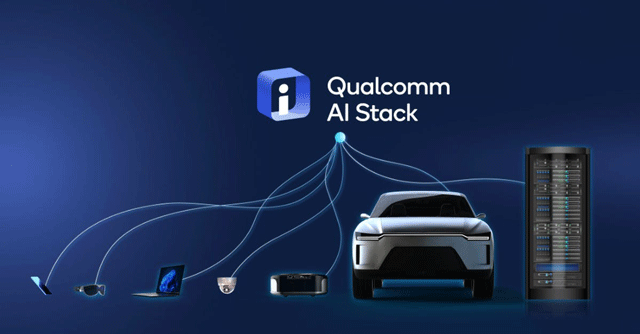
Qualcomm launches AI Stack to unify development for cars, phones, IoT and more


Qualcomm, on Wednesday, announced the launch of its AI Stack portfolio for developers, bringing a software stack that could allow companies to build uniform artificial intelligence (AI)-based applications across various product form factors. The launch essentially expands the company’s developer offerings in AI that it already had, but with the introduction of the AI stack, Qualcomm said that the scope of the software would include effectively all product categories that it offers hardware for – including phones, cars, the internet of things (IoT), mixed reality (XR) and cloud services.
A key part of the company’s AI Stack would be to leverage existing developer tools, and bring it to other form factors. For instance, the AI Stack would now allow developers building an AI application for a Qualcomm-powered smartphone to trickle over the same ability to a car’s infotainment interface, or connected home products.
The company has also clarified that the AI Stack will support a number of AI runtime environments, which include Google’s open source AI and machine learning (ML) framework TensorFlow, Meta Platforms’ PyTorch, and others. It will also support third party developer libraries, open source system software, tools and services, in order to help developers building on Qualcomm’s AI Stack to integrate a maximum range of features into their AI offering.

A product stack such as this can help developers scale their AI applications to a wider range of product form factors and types. During Qualcomm’s announcement, Microsoft also said that the company will be supporting Qualcomm’s AI Stack for Windows developers, and the former will also include Qualcomm’s own Neural Processing SDK for Windows. The move could allow AI applications based on Qualcomm’s hardware chips to run smoother on Windows – and in sync with how they run on other devices based on different software platforms.
Yuan Yu, a Distinguished Engineer at Microsoft’s AI frameworks architecture team, said that Qualcomm’s new offering could “offer edge-to-cloud AI capabilities” on Windows devices, by virtue of it being a suite of “unified, comprehensive AI software that scales from clients to servers.”
The software stack will also include existing features such as the company’s AI Model Efficiency Toolkit (AIMET) and developmental graphical user interface (GUI), which developers could use to scale their services depending on the level of power efficiency that different platforms can run at – and build interface that such each platform. For instance, the efficiency requirement of an embedded IoT product in a smart home appliance would require greater power efficiency than the system running inside a car, and the same applies for the user interface that each of these applications could have.

Qualcomm’s AI Stack claims that it will give developers a platform to help build all of this, at one place.
